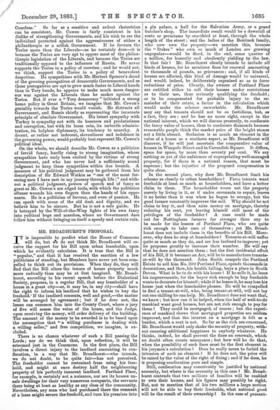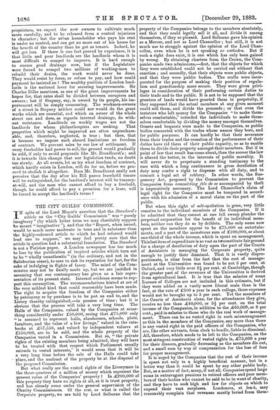MR. BROADHURST'S PROPOSAL.
IT is impossible to predict what the House of Commons will do, but we do not think Mr. Broadhurst will re- ceive the support for his Bill upon urban leaseholds, upon which he evidently calculates. It is true that the Bill is "popular," and that it has received the sanction of a few politicians of standing, but Members have never yet been com- pelled to think out its provisions. When they do, they will find that the Bill alters the tenure of house property much more radically than may be at first imagined. Mr. Broad- hurst, according to his recent speech before the Dialectical Society, proposes, in a regular Bill, that any leaseholder of a house in a great city—or, it may be, in any city—shall have the right to inform his landlord that he wishes to buy the freehold.' If the landlord consents, well and good,—the matter will be arranged by agreement ; but if he does not, the lessee can summon him into the County Court, where a jury of five will assess the value of the house, and the Judge, upon receiving the money, will order delivery of the building. The amount of the money to be awarded is to be based upon the assumption that " a willing purchaser is dealing with a willing seller," and free competition, we imagine, is ex- cluded.
There is no chance whatever of such a Bill passing the Lords ; nor do we think that, upon reflection, it will be esteemed just in the Commons. In the first place, the Bill involves a direct injury to the landlord amounting to con- fiscation, in a way that Mr. Broadhuret—who intends, we do not doubt, to be quite fair—has not perceived.
The freeholder cannot be restrained from using his free- hold, and might at once destroy half the neighbouring property of his perfectly innocent landlord. Portland Place, for example, is certainly not a nuisance, nor are its houses un- safe dwellings for their very numerous occupants, the servants there being at least as healthy as any class of the community. Nevertheless, any man who had purchased there the remnant of a lease might secure the freehold, and turn his premises into a gin palace, a hall for the Salvation Army, or a grand butcher's shop. The immediate result would be a downfall of rents or premiums by one-third at least, through the whole length of the street ; and the ladies of the Bentinck family, who now own the property—we mention this, because the " Dukes " who own so much of London are growing unpopular—would be fined, in the end, some quarter of a million, for honestly and obediently yielding to the law. Is that fair ? Mr. Broadhurst clearly intends to include all kinds of houses, for he mentions fines for renewal amounting to thousands of pounds, as grievances ; and, if all kinds of houses are affected, this kind of damage would be universal, and would, indeed, be deliberately organised so as to force reductions of price. Clearly, the owners of Portland Place are entitled either to sell their houses under restrictions as to their use, thus seriously qualifying the freehold ; or to be compensated for probable injury to the re- mainder of their estate, a factor in the calculation which would make the scheme unworkable. Mr. Broadhurst may say that tenants should not be so fastidious, but, as a fact, they are ; and he has no more right, except in the national interest, which we will discuss presently, to confiscate the fancy value of houses, than to confiscate diamonds because reasonable people think the market price of the bright stones not a little absurd. Seclusion is as much an element in the value of a house as a southern aspect, as Mr. Broadhurst will discover, if he will just ascertain the comparative value of houses in Wimpole Street and in Cavendish Square. It differs, space for space, by more than seventy per cent. We say nothing as yet of the unfairness of expropriating well-managed property, for if there is a national reason, that must be supreme ; but the injustice of the proposed compensation is quite clear.
In the second place, why does Mr. Broadhurst limit his scheme so closely to urban leaseholders ? Farm tenants want freeholds at least as much as householders, and have a better claim to them. The householder wears out the property merely by living in it, or if under covenants to repair, leaves it no better than it was when he began to occupy, but the good farmer constantly improves the soil. Why should he not claim to buy it, and then raise money on mortgage, thereby reducing his rent, yet leaving himself still most of the privileges of the freeholder ? A case could be made out for Nottingham farmers far stronger than any to be made for the lessees of Portland Place, who are quite rich enough to take care of themselves ; yet Mr. Broad- hurst does not include them in the benefits of his Bill. More- over, why does he stop at leaseholders ? Tenants-at-will suffer quite as much as they do, and are less inclined to improve; yet he proposes greatly to increase their number. He will say that he does not mention them ; but the first incidental effect of his Bill, if it becomes an Act, will be to manufacture tenants- at-will by the thousand. John Smith compels the Portland Estate to sell him No. 300 Portland Place, spends thousands in decorations, and then, his health failing, buys a place in South Devon. What is he to do with his house ? If he sells it, he loses his improvements, for the buyer rich enough to buy freeholds wants to decorate for himself ; while if he leases it, he may lose his house just when the leaseholder pleases. He will be compelled to find a tenant-at-will, who, being tenant-at-will, will not lay out one shilling he can help. kr. Broadhurst does not want that, we know ; but how can it be helped, when the half of well-to-do mankind want good houses, but are not rich enough to pay for them ? They could be mortgaged, of course ; but the experi- ence of mankind shows that mortgaged properties are seldom improved, and that the interest on a mortgage is felt as a burden, which a rent is not. So far as the rich are concerned, Mr. Broadhurst would only shake the security of property, with- out ensuring additional happiness to anybody whatever. He thinks, indeed, he shall prevent the fines on renewals, which no doubt often create annoyance ; but how will he do that, when the possibility of such fines must be the first element in his jurymen's calculation ? Does he really mean to forbid the intrusion of such an element ? If he does not, the price will be raised by the value of the right of fining ; and if he does, he is proposing confiscation pure and simple.
Still, confiscation may conceivably be justified by national necessity, but where is the necessity in this ease ? Mr. Broad- hurst contends that two millions of families will be enabled to own their houses, and his figures may possibly be right. But, not to mention that of his two millions a large section will not be able to buy their freeholds, what national good will be the result of their ownership I In the case of peasant- proprietors, we expect the new owners to cultivate much more carefully, and to be released from a control injurious to character ; but the urban householder who pays his rent is under no control, and can get no more out of his house for the benefit of the country than he got as tenant. Indeed, he will get less. If there is one fact proved by experience, it is that little and poor landlords are the landlords whom it is most difficult to compel to improve. It is hard enough to ensure good drainage now, but if the Legislature were forced to compel two millions of working-men to rebuild their drains, the work would never be done. They would resist by force, or refuse to pay, and how could payment be insisted on ? The wealthy position of London land- lords is the national lever for securing improvements. Sir Charles Dilke mentions, as one of the great improvements he hopes for, that rates shall be divided between occupiers and owners ; but if Stepney, say, is owned by its people, his im- provement will be simply unmeaning. The workmen-owners of a street in Stepney neither could nor would do the great works which are essential, and which an owner of the whole street can and does, as regards internal drainage, do with- out resistance. Landlords on weekly wages are not the landlords for whom philanthropists are seeking. That properties which might be improved are often unpurchase- able, and, therefore, neglected, is true ; but then, that is because we impose such absurd limitations on freedom of contract. We prevent sales by our law of settlement. If every freeholder had power to sell, the ground would gradually be sold, if only to avoid proposals like Mr. Broadhurst's ; and it is towards this change that our legislation tends, no doubt too slowly. At all events, let us try what freedom of contract, which hardly exists in London, will do for us, before we pro- ceed to abolish it altogether. Does Mr. Broadhurst really not perceive that the day after his Bill passes leasehold tenure will be extinguished, for the landlord's interest will be tenancy- at-will, and the man who cannot afford to buy a freehold, though he could afford to pay a premium for a lease, will be forced to accept the landlord's terms ?



































 Previous page
Previous page